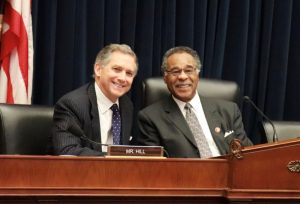
Bipartisan legislation introduced by U.S. Rep. French Hill (R-AR) to protect consumers against predatory debt collection practices on Nov. 14 received unanimous approval, 54-0, by the U.S. House Financial Services Committee.
“This bipartisan legislation will protect Arkansas consumers by putting government-hired debt collectors on a level playing field with private debt collectors,” said Rep. Hill, ranking member of the U.S. House Financial Services Subcommittee on National Security, International Development and Monetary Policy.
Rep. Hill on Sept. 19 cosponsored the Stop Debt Collection Abuse Act of 2019, H.R. 4403, with bill sponsor U.S. Rep. Emanuel Cleaver (D-MO) to amend the Fair Debt Collection Practices Act to restrict the debt collection practices of certain debt collectors, according to the bill’s text.
Currently, it is illegal under the Fair Debt Collection Practices Act for debt collectors to use abusive, unfair or deceptive practices to collect debts from consumers. However, the law includes an exemption for debt collectors hired by federal government entities, according to a summary provided by Rep. Hill’s office.
If enacted, H.R. 4403 would close that loophole by requiring federal agencies be held to the same standards under the law and would require the Government Accountability Office to conduct a study into the use of third-party debt collectors by state and local governments, the summary says.
“If Congress is going to set up fair debt collection practices to hold the private sector accountable, a federal agency collecting a debt from consumers should be held to the same standard,” Rep. Hill said. “Additionally, studying debt collection practices can help identify the right balance between protecting consumers and ensuring that access to credit is not restricted.”
The bill now advances to the full House for consideration, while the same-named S. 2516, introduced by U.S. Sens. Mike Lee (R-UT) and Cory Booker (D-NJ), is under consideration in the U.S. Senate.



